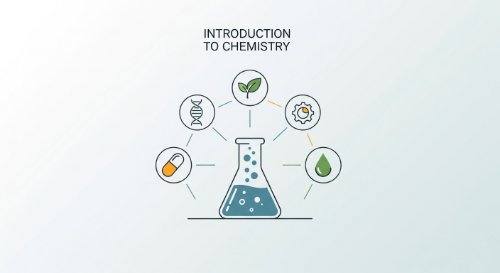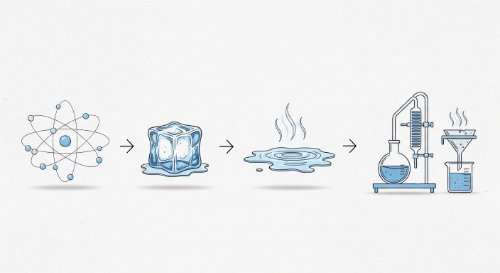What is chemistry? - Introduction | Introduction to Chemistry (Senior Secondary)
SPONSORED Get Personalized Tutoring NowStruggling with a tough concept or looking to advance your skills? Our expert tutors offer one-to-one guidance tailored to your unique needs.
Get instant support, clear explanations, and practical strategies to master even the most challenging subjects. With flexible scheduling and customized learning plans, success is just a session away.
Book your personalized tutoring today and start achieving your academic goals!
Get Personalized Tutoring NowStruggling with a tough concept or looking to advance your skills? Our expert tutors offer one-to-one guidance tailored to your unique needs.
Get instant support, clear explanations, and practical strategies to master even the most challenging subjects. With flexible scheduling and customized learning plans, success is just a session away.
Book your personalized tutoring today and start achieving your academic goals!
Struggling with a tough concept or looking to advance your skills? Our expert tutors offer one-to-one guidance tailored to your unique needs. Get instant support, clear explanations, and practical strategies to master even the most challenging subjects. With flexible scheduling and customized learning plans, success is just a session away. Book your personalized tutoring today and start achieving your academic goals!
 Introduction to Chemistry (Senior Secondary)This course establishes the full scope of chemistry. It covers the formal meaning of the discipline, its real-world applications, its adverse effects, and the scientific method that underpins all chemical inquiry. It also provides an overview of chemical industries and the career paths available to chemists.
A correct understanding of chemistry's role is essential for scientific literacy. This course provides the foundational context for all future study, linking abstract principles to industrial processes, career opportunities, and their societal and environmental impact. It is the necessary starting point for a structured education in the chemical sciences.
By the end of this course, you will be able to define chemistry, outline the steps of the scientific method, describe the applications and negative effects of chemical processes, identify major chemical industries, and list the primary career opportunities available to a chemist.
This course is designed for senior secondary students (SSS 1) beginning their formal study of chemistry. It provides the essential context required before proceeding to the study of matter, its properties, and the laws that govern its behaviour.
Introduction to Chemistry (Senior Secondary)This course establishes the full scope of chemistry. It covers the formal meaning of the discipline, its real-world applications, its adverse effects, and the scientific method that underpins all chemical inquiry. It also provides an overview of chemical industries and the career paths available to chemists.
A correct understanding of chemistry's role is essential for scientific literacy. This course provides the foundational context for all future study, linking abstract principles to industrial processes, career opportunities, and their societal and environmental impact. It is the necessary starting point for a structured education in the chemical sciences.
By the end of this course, you will be able to define chemistry, outline the steps of the scientific method, describe the applications and negative effects of chemical processes, identify major chemical industries, and list the primary career opportunities available to a chemist.
This course is designed for senior secondary students (SSS 1) beginning their formal study of chemistry. It provides the essential context required before proceeding to the study of matter, its properties, and the laws that govern its behaviour.
This course establishes the full scope of chemistry. It covers the formal meaning of the discipline, its real-world applications, its adverse effects, and the scientific method that underpins all chemical inquiry. It also provides an overview of chemical industries and the career paths available to chemists. A correct understanding of chemistry's role is essential for scientific literacy. This course provides the foundational context for all future study, linking abstract principles to industrial processes, career opportunities, and their societal and environmental impact. It is the necessary starting point for a structured education in the chemical sciences. By the end of this course, you will be able to define chemistry, outline the steps of the scientific method, describe the applications and negative effects of chemical processes, identify major chemical industries, and list the primary career opportunities available to a chemist. This course is designed for senior secondary students (SSS 1) beginning their formal study of chemistry. It provides the essential context required before proceeding to the study of matter, its properties, and the laws that govern its behaviour.
 ChemistryThis learning track provides the complete and essential foundation for the study of chemistry. It begins by defining the scope of the science, from its real-world applications to its career paths. The track then establishes the fundamental principles of matter, covering its classification into elements, compounds, and mixtures, and the practical laboratory techniques required for their separation. The track culminates in a rigorous introduction to the particulate nature of matter, detailing Dalton's atomic theory, atomic structure, and the concept of isotopes.
Mastery of this material is the non-negotiable prerequisite for all further study in the chemical sciences. It provides the core conceptual framework for understanding the composition of substances and the practical skills for their purification. By the end of this track, you will be able to classify any substance, select appropriate separation techniques for mixtures, and describe the structure of any atom in terms of its subatomic particles, atomic number, and mass number.
This learning track is designed for senior secondary students (SSS 1) beginning their formal study of chemistry. It provides the foundational knowledge required to proceed to the study of the periodic table, chemical bonding, and the quantitative analysis of chemical reactions.
ChemistryThis learning track provides the complete and essential foundation for the study of chemistry. It begins by defining the scope of the science, from its real-world applications to its career paths. The track then establishes the fundamental principles of matter, covering its classification into elements, compounds, and mixtures, and the practical laboratory techniques required for their separation. The track culminates in a rigorous introduction to the particulate nature of matter, detailing Dalton's atomic theory, atomic structure, and the concept of isotopes.
Mastery of this material is the non-negotiable prerequisite for all further study in the chemical sciences. It provides the core conceptual framework for understanding the composition of substances and the practical skills for their purification. By the end of this track, you will be able to classify any substance, select appropriate separation techniques for mixtures, and describe the structure of any atom in terms of its subatomic particles, atomic number, and mass number.
This learning track is designed for senior secondary students (SSS 1) beginning their formal study of chemistry. It provides the foundational knowledge required to proceed to the study of the periodic table, chemical bonding, and the quantitative analysis of chemical reactions.
This learning track provides the complete and essential foundation for the study of chemistry. It begins by defining the scope of the science, from its real-world applications to its career paths. The track then establishes the fundamental principles of matter, covering its classification into elements, compounds, and mixtures, and the practical laboratory techniques required for their separation. The track culminates in a rigorous introduction to the particulate nature of matter, detailing Dalton's atomic theory, atomic structure, and the concept of isotopes. Mastery of this material is the non-negotiable prerequisite for all further study in the chemical sciences. It provides the core conceptual framework for understanding the composition of substances and the practical skills for their purification. By the end of this track, you will be able to classify any substance, select appropriate separation techniques for mixtures, and describe the structure of any atom in terms of its subatomic particles, atomic number, and mass number. This learning track is designed for senior secondary students (SSS 1) beginning their formal study of chemistry. It provides the foundational knowledge required to proceed to the study of the periodic table, chemical bonding, and the quantitative analysis of chemical reactions.